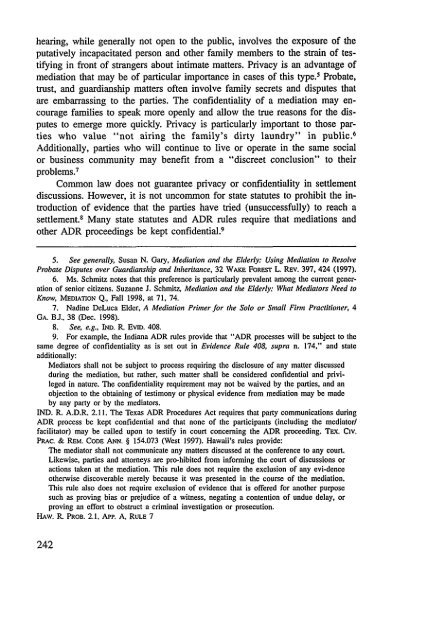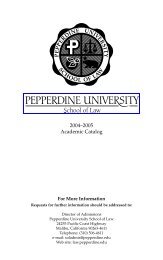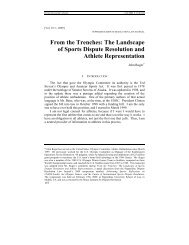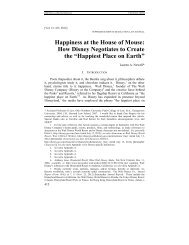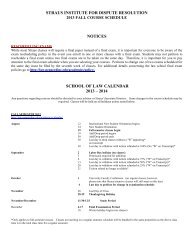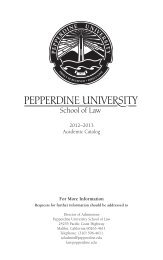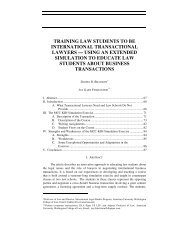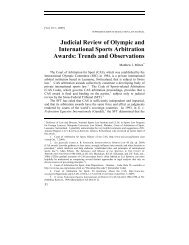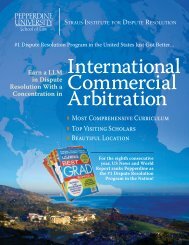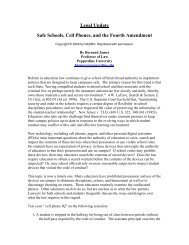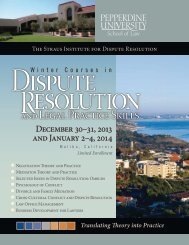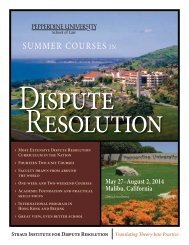Advantages and Disadvantages of Mediation in Probate, Trust, and ...
Advantages and Disadvantages of Mediation in Probate, Trust, and ...
Advantages and Disadvantages of Mediation in Probate, Trust, and ...
You also want an ePaper? Increase the reach of your titles
YUMPU automatically turns print PDFs into web optimized ePapers that Google loves.
hear<strong>in</strong>g, while generally not open to the public, <strong>in</strong>volves the exposure <strong>of</strong> theputatively <strong>in</strong>capacitated person <strong>and</strong> other family members to the stra<strong>in</strong> <strong>of</strong> testify<strong>in</strong>g<strong>in</strong> front <strong>of</strong> strangers about <strong>in</strong>timate matters. Privacy is an advantage <strong>of</strong>mediation that may be <strong>of</strong> particular importance <strong>in</strong> cases <strong>of</strong> this type. 5 <strong>Probate</strong>,trust, <strong>and</strong> guardianship matters <strong>of</strong>ten <strong>in</strong>volve family secrets <strong>and</strong> disputes thatare embarrass<strong>in</strong>g to the parties. The confidentiality <strong>of</strong> a mediation may encouragefamilies to speak more openly <strong>and</strong> allow the true reasons for the disputesto emerge more quickly. Privacy is particularly important to those partieswho value "not air<strong>in</strong>g the family's dirty laundry" <strong>in</strong> public. 6Additionally, parties who will cont<strong>in</strong>ue to live or operate <strong>in</strong> the same socialor bus<strong>in</strong>ess community may benefit from a "discreet conclusion" to theirproblems. 7Common law does not guarantee privacy or confidentiality <strong>in</strong> settlementdiscussions. However, it is not uncommon for state statutes to prohibit the <strong>in</strong>troduction<strong>of</strong> evidence that the parties have tried (unsuccessfully) to reach asettlement. 8 Many state statutes <strong>and</strong> ADR rules require that mediations <strong>and</strong>other ADR proceed<strong>in</strong>gs be kept confidential. 95. See generally, Susan N. Gary, <strong>Mediation</strong> <strong>and</strong> the Elderly: Us<strong>in</strong>g <strong>Mediation</strong> to Resolve<strong>Probate</strong> Disputes over Guardianship <strong>and</strong> Inheritance, 32 WAKE FoREsT L. REV. 397, 424 (1997).6. Ms. Schmitz notes that this preference is particularly prevalent among the current generation<strong>of</strong> senior citizens. Suzanne J. Schmitz, <strong>Mediation</strong> <strong>and</strong> the Elderly: What Mediators Need toKnow, MEDIATION Q., Fall 1998, at 71, 74.7. Nad<strong>in</strong>e DeLuca Elder, A <strong>Mediation</strong> Primer for the Solo or Small Firm Practitioner, 4GA. BJ.. 38 (Dec. 1998).8. See, e.g., IND. R Evo. 408.9. For example, the Indiana ADR rules provide that "ADR processes will be subject to thesame degree <strong>of</strong> confidentiality as is set out <strong>in</strong> Evidence Rule 408, supra n. 174," <strong>and</strong> stateadditionally:Mediators shall not be subject to process requir<strong>in</strong>g the disclosure <strong>of</strong> any matter discusseddur<strong>in</strong>g the mediation, but rather, such matter shall be considered confidential <strong>and</strong> privileged<strong>in</strong> nature. The confidentiality requirement may not be waived by the parties, <strong>and</strong> anobjection to the obta<strong>in</strong><strong>in</strong>g <strong>of</strong> testimony or physical evidence from mediation may be madeby any party or by the mediators.IND. R. A.D.R. 2.11. The Texas ADR Procedures Act requires that party communications dur<strong>in</strong>gADR process be kept confidential <strong>and</strong> that none <strong>of</strong> the participants (<strong>in</strong>clud<strong>in</strong>g the mediator/facilitator) may be called upon to testify <strong>in</strong> court concern<strong>in</strong>g the ADR proceed<strong>in</strong>g. TEx. Civ.PRAC. & REM. CODE ANN. § 154.073 (West 1997). Hawaii's rules provide:The mediator shall not communicate any matters discussed at the conference to any court.Likewise, parties <strong>and</strong> attorneys are pro-hibited from <strong>in</strong>form<strong>in</strong>g the court <strong>of</strong> discussions oractions taken at the mediation. This rule does not require the exclusion <strong>of</strong> any evi-denceotherwise discoverable merely because it was presented <strong>in</strong> the course <strong>of</strong> the mediation.This rule also does not require exclusion <strong>of</strong> evidence that is <strong>of</strong>fered for another purposesuch as prov<strong>in</strong>g bias or prejudice <strong>of</strong> a witness, negat<strong>in</strong>g a contention <strong>of</strong> undue delay, orprov<strong>in</strong>g an effort to obstruct a crim<strong>in</strong>al <strong>in</strong>vestigation or prosecution.HAW. R PROB. 2.1, App. A. RULE 7


